Colourful Characters: Aletta Jacobs
On 9 December 2025, it will have been exactly 400 years since Ubbo Emmius, the founder of the University of Groningen, passed away. In his tracks, various people who worked and studied there through the centuries made the UG a brighter place. Some of them have been exceptionally important, due to their remarkable achievements, ideas, and activities. This series sheds a light on some of these ‘Colourful Characters’. This week: Aletta Jacobs.
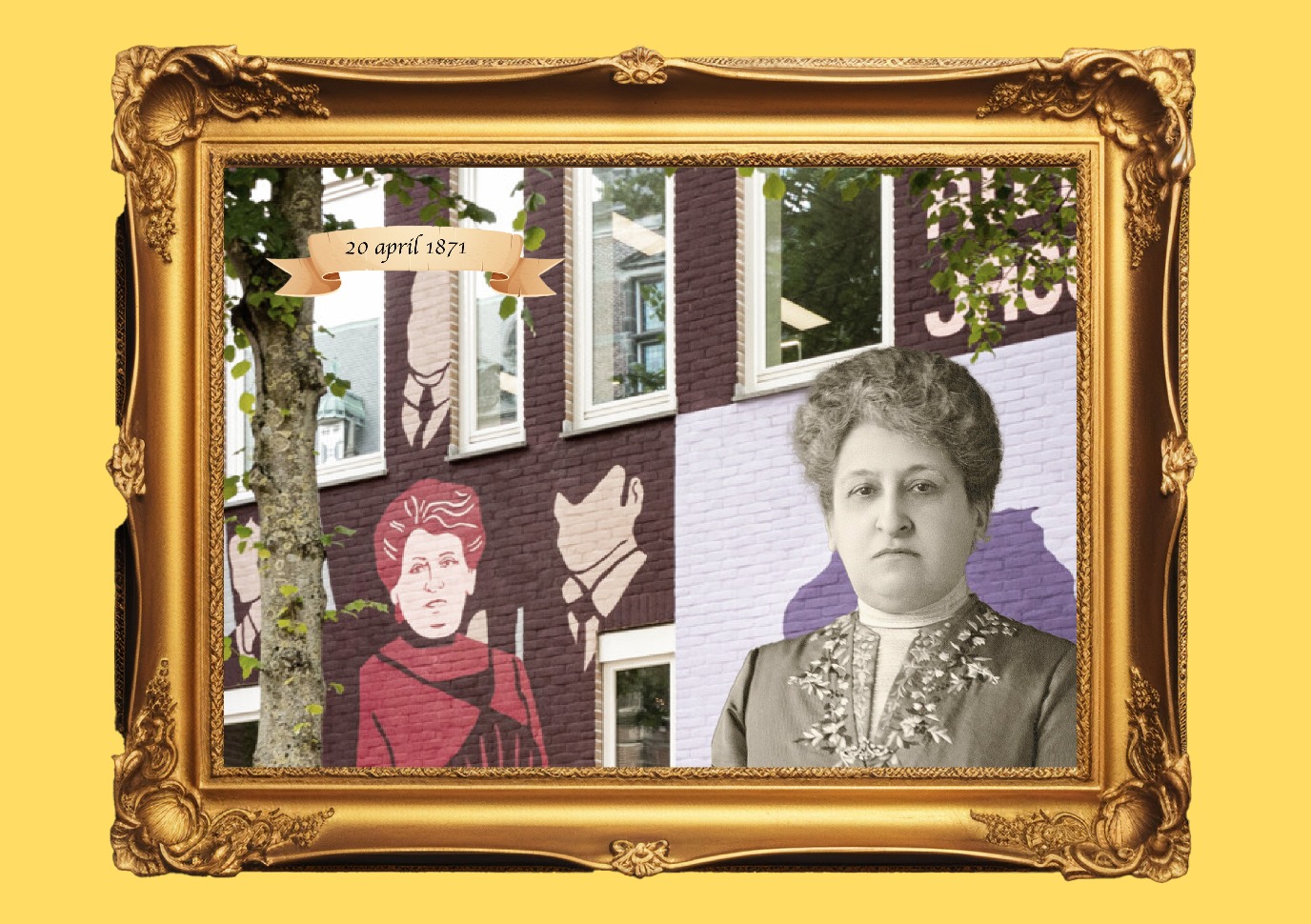
20 April 1871: Aletta Jacobs enrolls as a medical student at the University of Groningen
‘Such a thing could not have happened in Leiden or in Utrecht. It was possible only in Groningen, in the radical North.’ This is what B.D.H. Tellegen, Professor of Law in Groningen said in 1872, after Aletta Jacobs had completed her first exam. In 19th-century Netherlands, the widely held belief was that girls were not meant to study. Nevertheless, some people in Groningen thought differently about it.
The letter to Thorbecke
Aletta Henriëtte Jacobs was born on 9 February 1854 in Sappemeer, a village in the province of Groningen. She was the ninth child in a family of eleven. She came from a Jewish background that attached high value to learning, including for girls. Her father, Abraham Jacobs, was the village doctor. From the age of six, Aletta knew she wanted to be a doctor, just like her father and her older brother Julius. However, in her time, becoming a doctor was something only men did. Nevertheless, she became the first girl to be admitted to the HBS (Hogereburgerschool; the former Dutch secondary school for 12- to 18-year-olds) and was permitted to train as an apprentice pharmacist, which she completed with a diploma in 1870. After that, on 22 March 1871, Aletta wrote a letter on her own initiative to Johan Rudolph Thorbecke, Minister of the Interior, in which she asked him to be admitted to the University of Groningen to study medicine. Thorbecke asked Aletta’s father whether he had any objections (she was a minor at the time) and then gave her permission to attend lectures as an observer, initially for one year on a trial basis. So, on 20 April 1871, Aletta travelled to Groningen to register her name in the Album studiosorum. A few days later, her brother Julius accompanied her to her first lecture. On his deathbed, on 30 May 1872, Thorbecke, who was once again Prime Minister, granted Aletta a dispensation, after consultation with King William III, which allowed her to fully continue her medical studies.
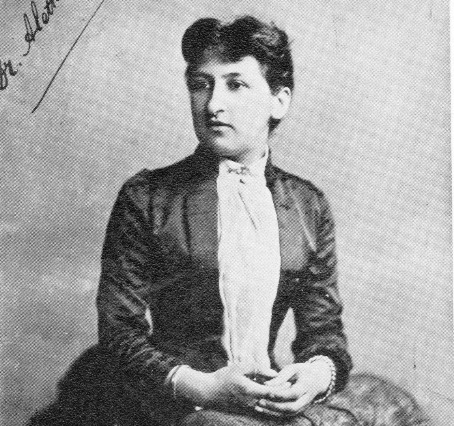
From daily commutes to PhD degree
Daily, Aletta commuted by train from Sappemeer to Groningen for her university studies. If she was slightly late, the train driver waited for her. After obtaining her Candidate degree in 1874, she had to do a clinical placement. For this reason, she moved in with carpenter Jan Fokkens at Turftorenstraat 23, between the Academy Building and the hospital (then located at Munnekeholm). In 1876, she moved to Amsterdam for the final physician’s assessment. In 1878, she received her medical degree, marking her as the first woman in the Netherlands to successfully complete a university degree. Aletta then returned to her parents’ home in Sappemeer to work on her PhD thesis. When her father became ill, she covered for him in his practice. Her friends encouraged her to keep working on her PhD thesis. On 8 March 1879, Aletta Jacobs received her PhD in the full Senate Room of the University of Groningen, becoming the first Dutch woman to earn a PhD.
London and Amsterdam
After receiving her PhD, Aletta went to London for several months, where she worked at a hospital. In the autumn of 1879, she started her own general practice in Amsterdam. She supported the use of contraceptives and treated poor working-class women for free twice a week. She wrote an anatomy book for women: The woman: her body and internal organs. She published articles on women’s suffrage, women’s rights, prostitution laws, and the transmission of STDs. In addition, she taught working-class women about hygiene.
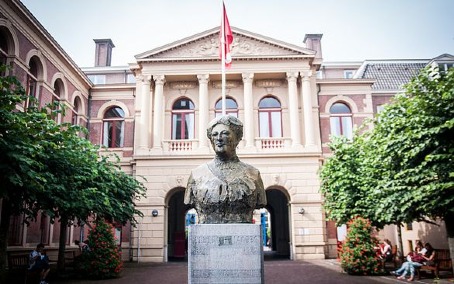
Suffrage for women
Aletta Jacobs was not a gifted speaker, but she compensated for it with strategic insight and determination. She could see that political equality would be the best foundation for improving women’s position in society, which is why she primarily dedicated her life to the struggle for women’s suffrage. Already in 1883, she submitted a request to the Municipality of Amsterdam to be included on the electoral list. That was not possible at the time, as she was a woman. In 1903, she became president of the executive board of the Vereeniging voor Vrouwenkiesrecht (the Association for Women’s Suffrage). She remained in that position until 1919, when active and passive suffrage for women was established in the Constitution.
Active in the peace movement
Aletta was also very active in the peace movement. In 1914, World War I started, as a result of which a planned congress of the International Woman Suffrage Alliance in Berlin could not go ahead. Instead, a women’s peace congress took place in The Hague from 28 April to 5 May 1915. The congress attendees focused on approaches for ending the war and sought structures for creating a peaceful society. The resolutions adopted there were personally presented to the heads of state of countries involved in the war and neutral countries. For example, Aletta visited US President Woodrow Wilson. Wilson used some of the information that was provided to him by Aletta and likeminded people for his Fourteen Points programme, which played a role in the formation of the League of Nations.
Aletta and Carel
In 1884, Aletta started living with politician Carel Victor Gerritsen, who was a municipal council member and alderman in Amsterdam, as well as a member of the Dutch House of Representatives. Gerritsen was also known for his broad collection of books about the women’s movement. Due to that book collection, he had the opportunity to get to know Aletta Jacobs better, as he lent her several books in 1880. In 1892, they legally married for practical reasons. Unwillingly, she took the vow of obedience to her lawful husband. They had one child in their marriage, who died on the same day. Carel Gerritsen died in 1905, and Aletta Jacobs died 24 years later, in 1929.
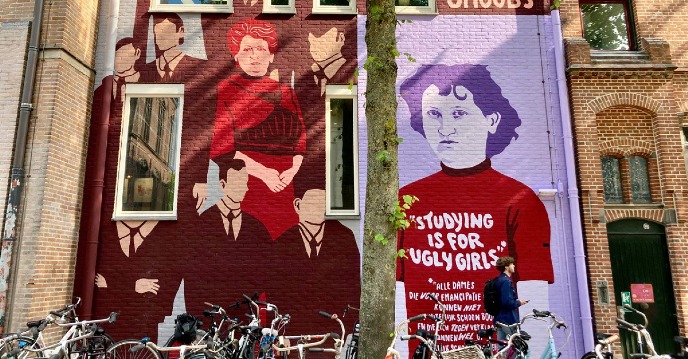
International Women’s Day and Aletta Jacobs
International Women’s Day was established at the Second International Socialist Women’s Conference in Copenhagen in 1910. It happened in response to the mass strikes in Chicago and New York on 8 March 1908. Women in the textile and clothing industry protested for an eight-hour working day, better working conditions, and suffrage. In 1978, the United Nations recognized March 8 as International Women’s Day. Whether a coincidence or not, March 8 is also the day on which Aletta Jacobs received her PhD in Groningen in 1879.
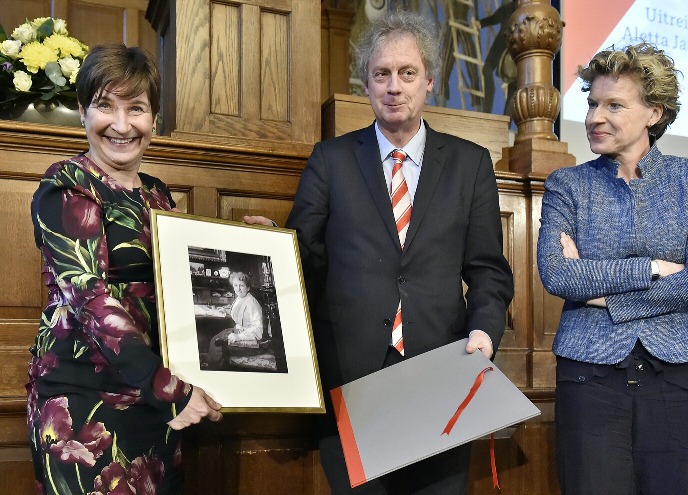
Aletta Jacobs in the city of Groningen today
A bust of Aletta Jacobs made by Theresia van der Pant can be found in front of the Harmoniegebouw at Oude Kijk in ’t Jatstraat. A large mural displaying Aletta Jacobs’ life and work can be found on Broerstraat. It was made by VAAF (Lotte Masker and Jonna Bo Lammers). Nowadays, UG students sit their exams in the Aletta Jacobs examination hall at Zernike Campus. Groningen also houses A. Jacobsstraat (A. Jacobs Street) in the Hoornse Park neighbourhood. One of the four interdisciplinary schools of the UG is named after her: the Aletta Jacobs School of Public Health. Every two years, on March 8, the UG presents the Aletta Jacobs Prize to ‘a woman with a university degree who assumes a pioneering role in emancipation and acts as a role model for other women.’
Aletta Jacobs
-
1854: Born in Sappemeer on 9 February
-
1871: On 20 April, admitted as a medical student
-
1878: Graduated as a physician
-
1879: On 8 March, received her PhD in Groningen
-
1884: Civil marriage with Carel Victor Gerritsen
-
1903: President of the executive board of the Vereeniging voor Vrouwenkiesrecht
-
1915: Women’s peace congress in The Hague
-
1919: Universal suffrage in the Netherlands established on 28 September
-
1929: Aletta Jacobs died in Baarn on 10 August
For more Colourful Characters, see the overview page.
More news
-
15 September 2025
Successful visit to the UG by Rector of Institut Teknologi Bandung
